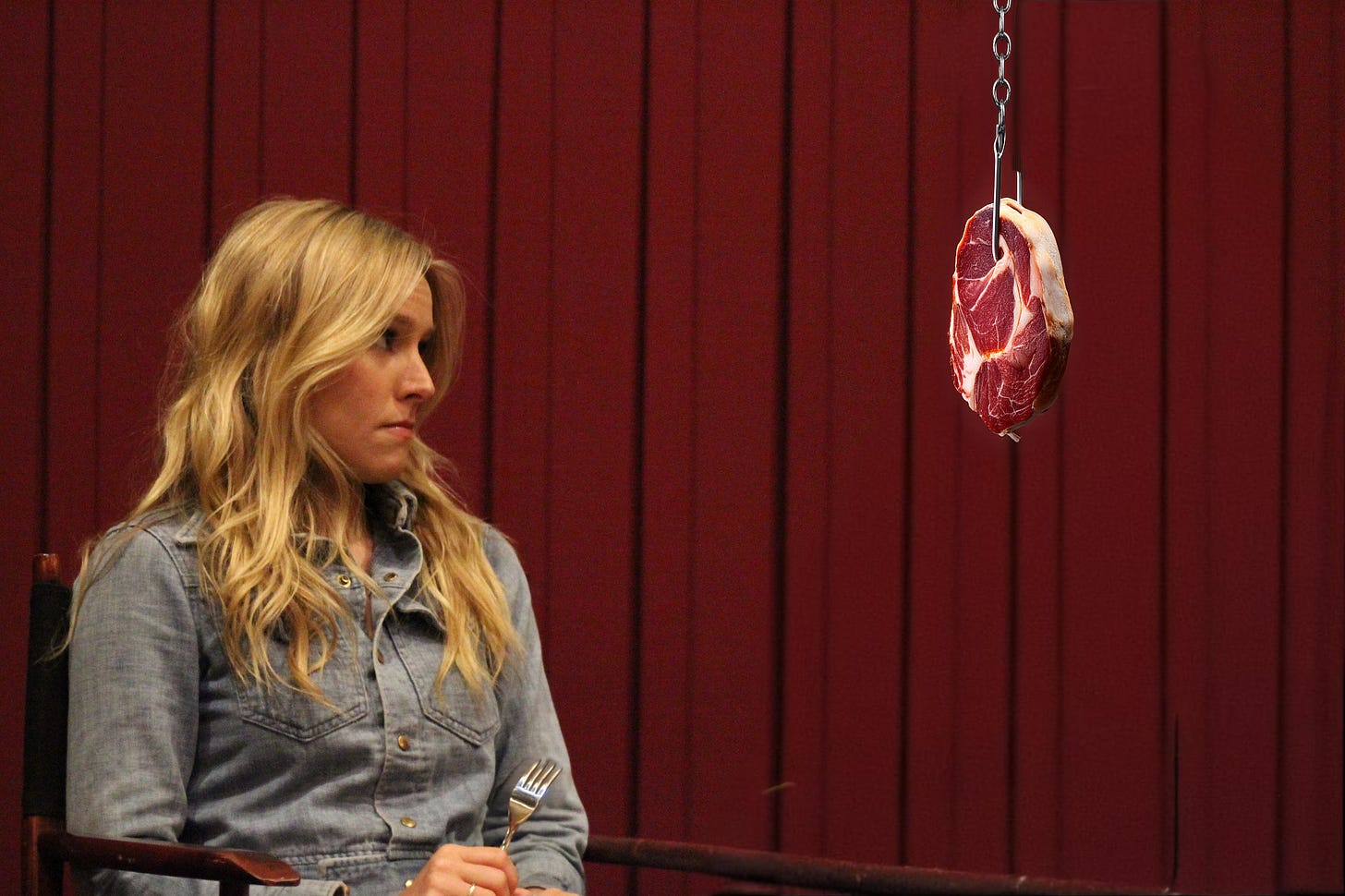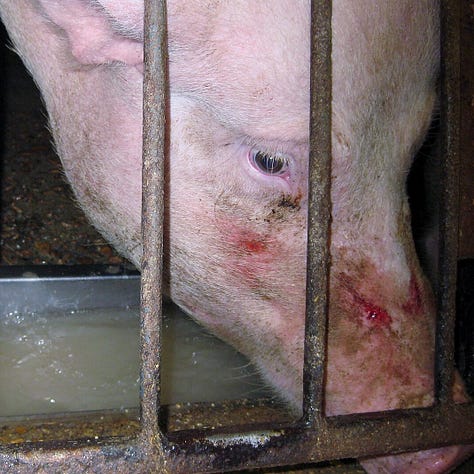An Open Letter to Vegetarian Turned 'Ethical Carnivore' Kristen Bell
Three vital points to consider

Background: Actress Kristen Bell, who had been a dedicated vegetarian since the age of 11, recently made the surprising decision to reintroduce meat into her diet after 30 years. While this may seem like a simple dietary change, the implications are far more significant than they first appear — a matter that I’ll address in this open letter.
Dear Kristen,
First and foremost, I want to express my gratitude for the inspiration and useful advice you’ve shared with so many people over the years, particularly in guiding others towards plant-based living.
You’ve always struck me as a genuinely positive and kind-hearted person, committed to making the world a better place.
That’s why I was both shocked and saddened when I recently learned that — after 30 happy meatless years — you’ve reintroduced animal flesh into your diet. This decision is concerning, especially considering the atrocious impacts that meat consumption has not just on animals, climate, and environment but also on humanity
As a public figure, your decisions have a significant impact. There’s a very real possibility that this choice will reverse much of the positive influence and inspiration you’ve shared with the world.
Let me be clear: I'm not here to insult you or to claim some moral high ground. I was a meat eater for most of my life, and I have very likely consumed more dead animals in my lifetime than you.
However, in this open letter, I feel compelled to address three points in your reasoning that have left me concerned and warrant urgent reflection.
You’re reading Vegan Horizon. I deliver straight talk on veganism — brave, disruptive, to the point. To receive weekly updates via email, make sure you subscribe if you haven’t. 👇
Problem 1: ‘Ethical Carnivore’ is an Oxymoron
Kristen, when you revealed you were eating meat again, you said:
“I call myself an ethical carnivore. I pay attention to where the meat comes from and how it's harvested and try to avoid factory farming — all the things that just help me sleep at night personally.”
While I understand your intention, the very phrase ‘ethical carnivore’ is deeply problematic. It’s an oxymoron, a contradiction in terms.
Can an industry that needlessly exploits and kills sentient beings truly be called ethical? Can we compassionately kill someone who wants to live? And are these supposedly ‘humane’ processes as clean and painless as we’re led to believe?
The High Welfare Meat Fantasy
Investigations have repeatedly shown that claims of humane treatment on meat and dairy labels are misleading. The phenomenon of “humane-washing” — where companies create a false image of ethical practices — has been widely exposed. An in-depth article in The Guardian concluded, “There's no such thing as humane meat or eggs. Stop kidding yourself.” Other news headlines have called humane slaughter “the biggest lie the meat industry tricked us into believing.” These findings are not isolated; countless experts have arrived at the same conclusion: marketing terms like “pasture-raised,” “humane,” “natural,” “responsible,” and “cage-free” are often deceptive, fostering misplaced trust in an industry that has done little to earn it.
Other Harms Caused by Animal Agriculture
Besides unfathomable amounts of animal suffering, the livestock sector is also a major cause of world hunger and climate change, a huge driver of pandemic risk and antibiotic resistance, a primary source of air pollution and water contamination, and the leading cause of ocean dead zones and deforestation worldwide.
If, as you say, you’re “allergic to inefficiency”, you should be allergic to this industry. Animal agriculture is so outrageously inefficient that it not only requires massive taxpayer subsidies to exist but also consumes vast amounts of grain, corn, soy, freshwater, land, and energy — far more than the production of plant-based foods.
To avoid ecosystem collapse and prevent the worst impacts of climate change, phasing out livestock production is not just an option — it’s an imperative. The case for a global shift to plant-based diets is overwhelming, and the urgency of this cause cannot be overstated.
It’s astonishing that so many people with your level of education continue to overlook — or wilfully ignore — these well-documented facts, risking their own well-being and the future of their children in the process.
Problem 2: Eating Animals Normalizes Violence
As a public figure, your decisions and statements inevitably carry weight. When you revealed your decision to reintroduce meat into your diet, you did it on a podcast with over 8 million followers.
There were instances where you even romanticized your shift away from plant-based living, speaking with enthusiasm about the groceries you plan to buy, painting a picture that made supporting animal exploitation seem not just normal, but desirable.
In a podcast, you jokingly suggested that your youthful appearance might be linked to your recent switch to eating meat, rather than the mostly plant-based lifestyle you followed for 30 years. While this obviously can’t be true, it’s still one of the “learnings” some listeners will draw from the podcast.
You Drive Sales of Factory-Farmed Animal Products
Even if you are committed to sourcing meat from animals raised under “premium” conditions (which, again, doesn’t guarantee animal welfare or environmental sustainability), the reality is that most of your fans won’t be able to afford the same.
In a society where the 99% of all meat comes from factory farms, your pro-meat stance will inspire people to buy and consume the remains of factory-farmed animals. Your choices, though they may seem harmless or small, contribute to the normalization of a global system of violent exploitation.



Complicity in Oppression
In times of rampant pro-meat misinformation, we urgently need people to take a stand against this abhorrent industry. Moderation isn’t about finding a middle ground that still allows for needless violence; it’s about moving society away from cruelty and towards compassion.
“All that is necessary for the triumph of evil is that good people do nothing.”
The suffering and destruction caused by the livestock sector are so far off the charts that living vegan — and actively advocating for it — should be the moral baseline for anyone with a functioning conscience. It’s far from everything we can do, but it’s the absolute minimum.
Problem 3: Lack of Justification
It is our responsibility as consumers to ensure that we have a sound justification for our choices, especially when our choices have victims. One of the most astonishing aspects of your shift back to eating meat is the complete lack of convincing reasons for doing so.
Questionable Reasons for Ditching Veganism
When you quit veganism in 2017, you justified it by saying you needed more calories, especially during your pregnancy.
I don’t want to dismiss your experience — health is understandably a top priority during such a vulnerable time, and it’s easy to become concerned about whether you’re getting the nutrients you need.
However, it's important to address a key point: meeting increased caloric needs on a vegan diet is not only possible but also quite straightforward. The largest dietetic organizations in the world, including the American Academy of Nutrition and Dietetics and the British Dietetic Association, have released clear statements affirming that a well-balanced vegan diet is nutritionally adequate for all stages of life, including pregnancy and lactation.
Plant-based foods can easily provide the extra calories needed, whether through nutrient-rich options like nuts, seeds, avocados, and whole grains or simply by adjusting the amount and frequency of your meals. So while I don’t dispute the personal concerns you had at the time, it’s clear that there were healthy, plant-based alternatives available to address your needs without compromising ethical commitments.
Isn’t it absurd, as a mother yourself, to pay for other sentient beings to have their newborns kidnapped and murdered and their mother’s milk stolen without any necessity?
No Reason for Quitting Vegetarianism
Your current justification for returning to meat — “I don’t know why” and “It came about randomly” — is particularly weak. It’s perplexing that such a significant change in dietary principles, which you previously upheld for well-considered reasons, is now dismissed without any clear reason.
Quotes from Yourself
Who am I to give you advice? Dear Kristen, there’s no need to listen to me — all I ask from you is to please listen to yourself:

“I love animals and feel better not eating them.” (Source)
“I’ve been a vegetarian since I was 11, because I couldn’t understand why if we didn’t eat the dog I should eat a burger. I love animals, and I stand by my values.” (Source)
“I have always been an animal lover. I had a hard time disassociating the animals I cuddled with — dogs and cats, for example — from the animals on my plate, and I never really cared for the taste of meat. I always loved my Brussels sprouts!” (Source)
“I think being vegan is a wonderful way to live and it has great effects on the body. I also think it has really good effects on the environment.” (Source)
— Kristen Bell —
Conclusion
In closing, Kristen, I urge you to reflect deeply on the choices you’re making and the far-reaching consequences they have. As someone who has long been a beacon of inspiration for ethical living, your return to meat sends a confusing and harmful message, both to your followers and to the broader cause of reducing unnecessary suffering.
I encourage you to remember the values you once stood for and explore the many ways to maintain health and vitality without compromising on compassion. The world needs voices like yours to lead us toward a kinder, more sustainable future, not away from it.
WILL KRISTEN EVER SEE THIS?
I’m not delusional. I know the chances that Kristen will read this open letter are slim. If you have any ideas on how to get this in front of her, let me know. We’re all just a few connections away from anyone in the world. So, who knows? Maybe we can make it happen! Help me increase the chances — and inspire others towards plant-based living — by sharing this post far and wide. 💛
Vegan Horizon is a reader-supported publication. To receive new posts and support my work, consider becoming a free or paid email subscriber.





Ugh, I wish people would just say "I like eating meat so I'll do it", rather than use ridiculous excuses like "ethical carnivore". I still shop at Amazon, but I'm not under any illusions that I do it "ethically". I also think we need to stop idolising vegan/vegetarian celebrities. So many of them go back and it's equally disappointing every time they do.
What an incredibly powerful letter--extremely compelling and presented in such a respectful and compassionate way; which most certainly increases the chances that Bell (and others) will be receptive to your powerful words. Bravo